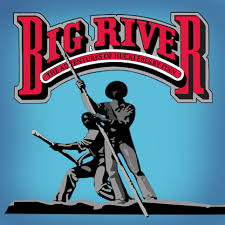I used to complain that too few new musicals were opening on Broadway. A metaphor comes to mind: a field of dirt had grown so hard, very few seeds could take root. I don’t know whether we can rightly call Hamilton a massive plow that turned over the soil, but, folks, this is one exciting season. The quantity of truly new musicals (I don’t include Irving Berlin’s Holiday Inn), who they’re by, what they’re about – all good. The field’s a blooming miracle.
Here’s another image of tearing down and starting over, a palpable revolution: Take a large old theatre and tear out all the seats. Create little stages all over the place, so that action occurs all around the audience. This is Natasha, Pierre and the Great Comet of 1812. Dave Malloy’s songs are markedly different from anything I’ve ever heard on Broadway. Now, that title’s so unwieldy, people aren’t sure what to call it. It reminds me that in the heyday of the Broadway musical, shows often had titles that were different from their source material: Sweet Charity, Hello Dolly, Promises Promises, A Little Night Music, Man of La Mancha, to name some hits. In recent years, tons of shows based on movies have kept those titles, hoping to lure fans of the flicks to buy tickets: Legally Blonde, Catch Me If You Can, Sunset Boulevard, Waitress. So, you know what Natasha Pierre and the Great Comet of 1812 is based on? A small section of War and Peace. But that’s in the fine print. Josh Groban’s name is far bigger because he’s the thing that used to be common and now is rather rare: a big Broadway star whose name sells tickets.
The Comet‘s chief competition in the Tony race so far is a totally original musical named Dear Evan Hansen. It’s gratifying to see its recording ascending the Billboard sales chart like no show has for half a century. Songwriters Benj Pasek and Justin Paul are young theatre people who are certainly having their moment in the sun: they also wrote the lyrics to La La Land.
Composer Alan Menken has many Oscars on his shelf. For 35 years, he (certainly not Sondheim) has been the dominant show tune-smith. His new show this season is based on Chazz Palminteri’s memoir that became a monologue for the theatre and then a fine conventional movie about a quarter century ago: A Bronx Tale. Lyrics by Glenn Slater. Each songwriter has another musical running on Broadway now: Aladdin and School of Rock.
You may recall I was disappointed by In Transit, but, setting the execution aside, the kind of show it is gladdens my heart. It’s not based on anything. It’s unusual in that there’s no orchestra: it’s all a cappella, the vocal accompaniment musical directed by my old friend, Rick Hip-Flores. The four writers have devoted themselves to theatre-writing – it’s their Broadway debuts – which, to my mind, is SO much better than when rock stars come slumming here, figuring, like a dilettante, that they’ll give Broadway a try.
So that’s what the season has been so far. What’s to come is also cause for excitement.
Come From Away, which I described last September, may be the right show for this turbulent time, since it’s the true story of Canadians welcoming immigrants. Totally original, and its writers’ debuts.
Amélie is songwriter Daniel Messé’s debut, and I know it seems as if I’m just giving my é key a workout, but Messé has teamed up with Broadway vets Nathan Tysen and Craig Lucas, who always does interesting work.
Scott Frankel and Michael Korie are songwriters of such quality, I’m automatically interested in anything they do. In War Paint, they’ve two major Broadway talents heading the cast, Patti LuPone and Christine Ebersole. Big stars in an original musical? That doesn’t happen often these days.
It now strikes me that my sister has seen those last two shows, and I haven’t. But I don’t get to everything: For years I’d walk past the August Wilson Theatre and see the same marquis for Jersey Boys and have no interest in stepping inisde. The second day this month, I was startled to see the familiar sign was gone. Instead, in rather plain lettering, it said Groundhog Day. Since it was, in fact, Groundhog Day, I thought maybe they were just telling everybody what day it was. But the sign has stayed, so I’m reminded that the most eagerly-anticipated musical of the current season is, indeed, Groundhog Day, based on the beloved film, with songs by Matilda’s Tim Minchin. Years ago, Stephen Sondheim was working on an adaptation. Perhaps one day we’ll all wake up day after day and see it again.
The other London transfer is Charlie and the Chocolate Factory, with songs by Broadway vets Marc Shaiman and Scott Wittman. Besides name recognition and family-friendliness, Willy Wonka will be warbled by two-time Tony winner Christian Borle. So there’s plenty of reason to believe this will be a Golden Ticket.
The songwriters I’m most enthusiastic about are Lynn Ahrens and Stephen Flaherty. They’re adapting their animated film Anastasia for the stage. So, that’s a score we already know some of, and the some we know is choice. But I don’t go to the theatre excited to hear what I’ve heard before. My heart will be blessed by the sound of their new songs, fleshing out the score.
The last day of the season, Bandstand will open, the debut of its writers. It’ll be the season’s second show (the other was A Bronx Tale) that tried out at Paper Mill Playhouse, where I work from time to time. The prodigiously talented Andy Blankenbuehler is staging it and the star is Laura Osnes: reasons to go; reasons for optimism.
Used to be, we’d wait months and months between new musicals. This spring, they’re busting out all over.



 Posted by Noel Katz
Posted by Noel Katz 


